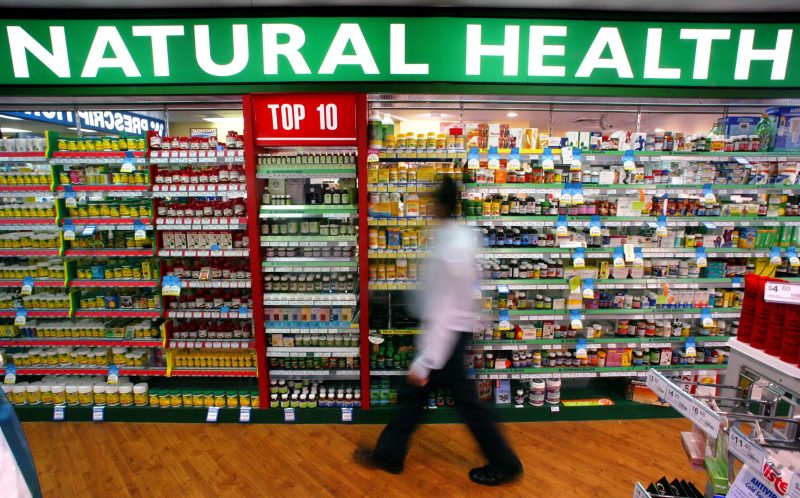Mass equals gas.
It’s a refrain you hear from today’s pitchers, even from early adolescent ages, bent on increasing their velocity with added size. It’s not just baseball.
Walk around a high school athletic field, court or track and you’ll see kids who are larger and sleeker than they were just a decade or two ago.
Young athletes are lifting weights and taking over-the-counter dietary supplements in an attempt to gain size and power. The three most common of these performance enhancing substances (PES), according to the American Academy of Pediatrics (AAP): Creatine, caffeine and protein supplements.
‘I think sometimes what happens is that a child who’s really interested in adding strength and muscle bulk, they’ll do a lot of things at the same time,’ says Rebecca Carl, chair of the American Academy of Pediatrics’ Council on Sports Medicine and Fitness, ‘and so then it’s not clear if they’re taking caffeine and creatine and they’re on protein supplements and they’re lifting what’s helping them.
‘There’s a big issue with contamination,’ she says.
How much do supplements help? How safe are they? USA TODAY Sports spoke with Carl, a sports medicine physician and associate professor of pediatrics at Northwestern University Feinberg School of Medicine, about children and adolescents’ use of popular supplements and healthy weight gain.
Creatine: Benefits ‘really doubtful’ for kids
According to the U.S. Anti-Doping Agency (USADA), creatine is produced in your liver, kidneys, and pancreas, then stored as phosphocreatine in your muscles, and our bodies use phosphocreatine to help ‘jumpstart’ during exercise.
The USADA says creatine is also found in red meat, salmon, milk, eggs and mollusks.
Taking in the compound as a supplement, however, is highly popular but also somewhat controversial among the adolescent population.
While you might know a coach who suggests taking creatine supplements, the AAP doesn’t recommend children or adolescents take them.
‘There are not studies demonstrating safety in children/adolescents,’ Carl says. ‘More recent reviews suggest that creatine can be used safely but these are generally studies of adults.
‘Your body can make creatine so it’s not needed in the diet. There is creatine found naturally occurring in things like meat and fish. But taking it as a supplement, we don’t know if there’s harm in doing that for children.
‘The other thing is it has a very narrow performance benefit.’
Carl says creatine could aid athletic bursts of one to three seconds but probably not with overall sports performance.
‘If I was summarizing it for a family, I’d say for most athletic activities, the benefits of creatine are really doubtful,’ she says. ‘There may be some benefit for really explosive, short activities. The classic would example be a weightlifter who does a single maximum lift, then there’s probably a performance benefit for that … (but) probably not even repetitive activities like that.
‘There’s not a benefit for certainly any sport where there’s an endurance component of it.’
So for baseball, for example, Carr says, creatine might help you with a single swing or single pitch, but not a series of swings or pitches.
‘PES use does not produce significant gains over those seen with the onset of puberty and adherence to an appropriate nutrition and training program,’ the AAP says in its most recent policy statement on performance-enhancing substances, which Carl says is reviewed every four years.
Coach Steve: When can teenagers start lifting weights? What about a personal coach?
Protein bars, powders and shakes: ‘Totally unnecessary’ for most kids
Two in five parents say their teenager consumed protein supplements over a one-year period, according to a 2024 University of Michigan Health C.S. Mott Children’s Hospital National Poll on Children’s Health.
Teens think they are taking them to build muscle, but the AAP says there’s no performance benefit to protein supplement if a diet provides adequate protein.
‘Protein supplementation is for most children totally unnecessary because they get enough protein in the diet,’ Carl says. ‘Even kids who are lifting.’
If an athlete is a vegan or has other has dietary restrictions, Carl might have them see a registered dietician to determine how much protein and nutrients their body needs.
The AAP recommends that children 4 years and older and adolescents get 10-30% of their daily calories from protein.
Generally, Carl says, adolescents should take in 0.5 grams of protein per pound pound of body weight per day. Those needs may be higher for athletes engaged in intense activity or resistance training.
‘Getting adequate protein through the diet is best, especially given the issue of possible contamination,’ Carl says. ‘One other thing that is an important issue with all of these supplements is that supplements aren’t regulated the way that drugs are, so you don’t have to pull a supplement from the market until it causes harm. (With) medications, you have to prove that it’s safe first.’
Caffeine and energy drinks: ‘The risk of taking too much’
The amount of caffeine in food (soft drinks are allowed a maximum of 71 milligrams of caffeine per 12 ounces) is regulated by the U.S. Food and Drug Administration (FDA). Caffeine in energy drinks and other dietary supplements isn’t.
‘Most children take caffeine, whether or not they’re doing it as a supplement, so it’s not that we think kids shouldn’t have any caffeine,’ Carl says, ‘but some of the energy drinks that have really high doses, there’s been emergency room visits over taking too much of it.’
AAP research connects significant toxicity with the ingestion of multiple energy drink. The AAP doesn’t recommend kids and adolescents drink them at all.
The AAP has guidelines about safe caffeine use. According to its PES statement, 1 to 3 milligrams per kilogram has been shown to have performance-enhancing effects, particularly in endurance activity, strength of knee extensors and improvements in time to exhaustion studies.
So, for example, Carl says a child weighing 40 kilograms (or 88 pounds) would take 120 milligrams.
‘Caffeine does have performance benefits, and it’s safer than things like, certainly anabolic steroids and some of the more notorious agents,’ Carl says. ‘I think in specific circumstances, there may be a benefit to taking caffeine, but there’s also the risk of taking too much of it.’
Some potential adverse effects of caffeine overdose include cardiac arrhythmias (premature ventricular contractions), increased blood pressure, headaches, irritability, sleep disruption, tremor and gastric irritation and increased core body temperature with exertion in hot environments.
The FDA issued a warning in 2018 about supplements consisting of pure or highly concentrated caffeine in powder or liquid form.
‘It is very difficult to tell the difference between what is a safe amount and what may be a toxic or even lethal amount of this bulk product,’ the FDA said in the statement. ‘Caffeine is a powerful stimulant and very small amounts of pure or highly concentrated caffeine may have serious effects and could even be deadly.’
If you have read Richard Ben Cramer’s biography about Joe DiMaggio (‘The Hero’s Life’), you know the baseball legend used to drink many cups of coffee before games to get a boost.
According to FDA calculations, DiMaggio would have had to go on a 28-cup binge to equal the same amount of caffeine in one teaspoon of pure powdered caffeine.
Coach Steve: What are the keys for young baseball players to realize their potential?
Guidelines for adolescent weight gain
According to its statement on weight control practices in young athletes, the AAP recommends athletes who want to gain weight and add lean muscle mass do so gradually, and without supplements:
For Boys: Up to a half-pound or pound per week.
For girls: up to one-quarter to three-quarters of pound per week.
If you’re maintaining body weight while adhering to the protein guidelines above, consume an extra 300 to 500 calories above your baseline intake, an extra 14 grams of protein, strength train and get adequate sleep.
The AAP doesn’t necessarily use a maximum weight recommendation for height. Carl says Body Mass Index measurements, which have traditionally been used, are not as helpful for athletes with higher lean body mass.
‘BMI classify individuals as obese even if they have low body fat (and) more muscle mass,’ she says. ‘We tend to think in terms of recommendations of how to gain muscle mass.’
The problem with supplements and the next level
About 10 years ago, as The New York Times reported, the New York State attorney general accused four major retailers of selling fraudulent and potentially dangerous herbal supplements.
‘Sometimes that’s an issue for things like allergies – if you’re allergic to garlic and there’s garlic power or something like that – but some things they have steroid derivatives in them that could really be harmful,’ Carl says of dietary supplements.
We routinely hear from professional athletes who say they didn’t knowingly take a substance banned by their league for which they tested positive. Our children are eventually going to be held accountable, too.
‘At the college and professional level, they will recommend athletes not take any kind of supplements unless they have cleared it with the athletic trainers or coaching staff because sometimes there’s things that shouldn’t be in there,’ Carl says.
Steve Borelli, aka Coach Steve, has been an editor and writer with USA TODAY since 1999. He spent 10 years coaching his two sons’ baseball and basketball teams. He and his wife, Colleen, are now sports parents for two high schoolers. His column is posted weekly. For his past columns, click here.

